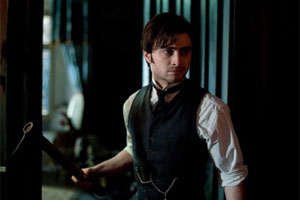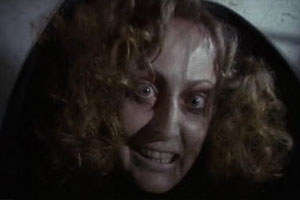Arousing the horror that lurks within a gothic mystery is a terrifying experience and proves that graphic dramatic action or blood and gore are no substitute for real fear.
The Woman In Black is such an astounding experience; cloaked in the mystery that shrouds a haunted house, the exploration of a young lawyer and single father exposing the truth behind deadly secrets and finding closure will have you on the edge of your seat.
In The Woman in Black a young London solicitor Arthur Kipps (Daniel Radcliffe) is forced to leave his three-year-old son and travel to the remote village of Crythin Gifford to attend to the affairs of the recently deceased owner of Eel Marsh House. But when he arrives at the creepy old mansion, he discovers dark secrets in the villagers' past, and his sense of unease deepens when he glimpses a mysterious woman dressed all in black.
The masterful suspense that is created from the opening scene, and meticulously suspended throughout the film until the hair-raising conclusion, is in the hands of director James Watkins; he made his directing debut with the critically acclaimed thriller Eden Lake (only released on DVD locally), which was declared "The best British horror film in years" (The Guardian), and won the Empire Award for Best Horror, the Jury Prize at Sitges Fantasy Film Festival and Best Director at Fantasporto.
A master of suspense
Watkins is a master of suspense, and in the tradition of Hitchcock, understands the mechanics of fear; he does not rely on cheap-and-nasty graphic gore to shock the senses, but with a skilled actor like Daniel Radcliffe in the lead, Watkins dissects fear to the bone and exposes the essence of what instils terror.
Screenwriter Jane Goldman, who is the author of four non-fiction books for young adults: the novel Dreamworld, and the number one best-selling non-fiction, two-volume series The X-Files Book of the Unexplained, understands the world of fantasy and fear, and she perfectly captures the spirit of Susan Hill's hit novel, a dark tale of loss, vengeance and mourning that was first published in 1982 and has since been turned into a TV movie, a radio series, a play (which has been running in London for more than 20 years) and now a feature film.
Goldman also knows how to deal with the world of fantasy and intrigue, having previously co-written the screenplays for Stardust, for which she won the 2008 Hugo Award for Best Dramatic Presentation, and the thriller The Debt.
Captivating and creepy
The Woman In Black proves that in the end it is ultimately about a good story well told; Watkin's haunting visualisation of a world of sinister shadows and dormant secrets is captivating and creepy.
You know that fear grips your imagination and unleashes nightmarish visions when you find that you stop breathing; and in The Woman In Black, that happens quite often.
Fortunately, it is not a horror film, or essentially a story about a haunted house, but a beautifully crafted story about loss and the search for redemption. Yes, the redemption could be vengeful and filled with anger, but in The Woman In Black it results in an emotional experience that breaks the heart and does not destroy the soul with mean-spirited intentions.
The unhappiness that clouds reason
It's a heartrending romance about finding answers to the unhappiness that clouds reason and prevents us from bringing an end to the misery caused by apprehension and confusion. It is not always possible to see through the mist that clasps the unsolved mystery in its clammy claws, but is it definitely possible to be consumed by the fear that hides within; it is this magic formula that turns The Woman In Black into an exceptional and rewarding visceral experience.
It delivers what it promises, but more importantly, it leaves one with a great story that guarantees to live on long after you have left the cinema. You are guaranteed always to remember The Woman In Black - she will taunt your imagination to ensure that you will never forget her heartbreaking tale.
Behind the scenes
This is the first time Hill's novel - now nearly 30 years old - has been adapted for the big screen. The project first came to producer Richard Jackson, of Talisman Films, as far back as 1997. Following the success of Talisman's production of Rob Roy, Hill's agent approached Jackson to explore the possibility of a big screen adaptation of The Woman In Black. "It turned out to be a surprisingly tricky story to adapt," he confided. "Over the years, we made several attempts with different screenwriters to adapt the story and I was never fully satisfied with the scripts we were getting."
Eden Lake director James Watkins had read a story in the trade press about Jane Goldman writing the screenplay and asked his agent to inquire about the project. "I'd been working on a ghost story myself, but I couldn't make it work for me," Watkins explained. "When I read Jane's script, it spoke to everything that I wanted to achieve with the other project. It just had that sense that it was scary, but it also had an emotional element in it. It really moved me and as soon as I'd read it I knew I wanted to do it."
Daniel Radcliffe needed to strike out from the role of the boy wizard that made him famous. "I'm very, very proud of Potter," Radcliffe said, "but I now have to prove to people that I'm serious about acting - and I think the way to do that is to start selecting some interesting material." Goldman's screenplay, and the meeting with Watkins, was enough to convince the young actor that Arthur Kipps would be the right challenge to take on. "Arthur is so complex, but there's a real stillness to him as well," Radcliffe said. "It was a very interesting character to get the chance to play. The opportunity to play in a Victorian ghost story was also appealing."
For Watkins, Daniel Radcliffe brings a sense of maturity to the role of Arthur Kipps that was exactly what he was looking for. "He's just so dedicated to his craft," Watkins explained. "He put a lot of trust in me and allowed me to take him to different places in terms of his acting and the role, and I think he's really excavated and explored aspects of himself and pushed himself as an actor in really different ways." Watkins thinks audiences will be surprised by Radcliffe's transformation for the role. "It's a reinvention of Dan, as Dan the grown-up actor," he said. "I think people are going to be quite breathtaken when they see the new Dan."
Read more at www.writingstudio.co.za/page4111.html
































